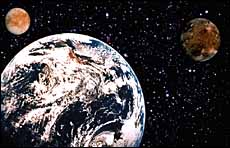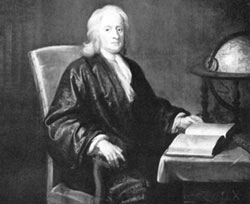|
|
INTRODUCTION
Isaac
Newton was the greatest scientist who has ever lived. It is, in
fact, generally accepted that he is the greatest scientist who
ever will live, since no one, no matter how brilliant, will ever
again be in such a unique historical position.
Isaac Newton was born on Christmas day in 1642 and died in 1727.
His most famous work, Philosophiae Nauralis Principia Mathematica
(commonly called the Principia), was published in 1687. His discoveries
span all aspects of the physical world with special emphasis on
experimental and theoretical physics and chemistry and applied
mathematics. He invented virtually the entire science of mechanics
and most of the science of optics. During this time he invented
such mathematics as he needed or as interested him including the
discipline known as calculus.
His (and the world's) greatest scientific work, the Principia,
was published only after his friend, Edmund Halley, accidentally
learned of the existence of Part I which Isaac Newton had written
10 years earlier and put in a drawer. Halley convinced him to
finish Part II and III and allow Halley to publish the work.
Of unequaled mental ability during his entire adult life until
his death at age 85, Newton's powers are legendary. It is often
told, for example, how later in his life a problem in mathematical
physics posed by the great mathematician, Bernoulli, was forwarded
to the Royal Society. The problem, to determine the curve of minimum
time for a heavy particle to move downward between two given points,
had baffled the famous 18th century mathematicians of Europe for
over six months. Receiving the problem in the afternoon, Newton
solved it before going to bed!
In addition to his scientific work (Newton would have said as
a part of his scientific work), he devoted a substantial portion
of his enormous energy to the study of the Bible and Biblical
texts and history. He read the Bible daily throughout his life
and wrote over a million words of notes regarding his study of
it.
Isaac Newton believed that the Bible is literally true in every
respect. Throughout his life, he continually tested Biblical truth
against the physical truths of experimental and theoretical science.
He never observed a contradiction. In fact, he viewed his own
scientific work as a method by which to reinforce belief in Biblical
truth.
He was a formidable Biblical scholar, was fluent in the ancient
languages, and had extensive knowledge of ancient history. He
believed that each person should read the Bible, and through that
reading, establish for himself an understanding of the universal
truth it contains.
Only one book of Newton's about the Bible was ever published.
In 1733, six years after his death, J. Darby and T. Browne, published
Observations Upon the Prophecies of Daniel and the Apocalypse
of St. John.
With his prodigious knowledge of ancient history and languages
and his unequaled mental powers, Isaac Newton is the best qualified
individual in this millennium to have written about the prophecies.
His study of the Book of Daniel began at the age of 12 and continued
to be a special interest throughout his life. Moreover, he writes
of the prophecies with a modesty that indicates that he, himself,
is in awe of the words he has been given an opportunity to read.
Isaac Newton concluded that it is intended that Revelation will
be understood by very few until near the end of history, the time
of judgment, and the beginning of the everlasting kingdom of the
Saints of the Most High. Here is an excerpt from that book:
This prophecy is called the Revelation, with respect to the Scripture
of Truth, which Daniel was commanded to shut up and seal, till
the time of the end. Daniel sealed it until the time of the end,
and until that time comes, the Lamb is opening the seals: and
afterward the two Witnesses prophesy out of it a long time in
sackcloth, before they ascend up to heaven in a cloud. All of
which is as much as to say, that the prophecies of Daniel and
John should not be understood till the time of the end: but that
some should prophesy out of it in an afflicted and mournful state
for a long time, and that but darkly, so as to convert but few.
But in the very end, the Prophecy should be so far interpreted
so as to convince many. Then saith Daniel, many shall run to and
fro, and knowledge shall be increased.
For the Gospel must first be preached in all nations before the
great tribulation, and end of the world. The palm-bearing multitude,
which came out of this great tribulation, cannot be innumerable
out of all nations unless they be made so by the preaching of
the Gospel before it comes. There must be a stone cut of the mountain
without hands, before it can fall on the toes of the Image, and
become a great mountain and fill the earth. An Angel must fly
through the midst of heaven with the everlasting Gospel to preach
to all nations, before Babylon falls, and the Son of man reaps
his harvest. The two prophets must ascend up to heaven in a cloud,
before the kingdoms of this world become the kingdoms of Christ.
'Tis therefore a part of this Prophecy, that it should not be
understood before the last age of the world; and therefore it
makes for the credit of the Prophecy, that it is not yet understood.
But if the last age, the age of opening these things, be now approaching,
as by the great success of late Interpreters it seems to be, we
have more encouragement that ever to look into these things.
If the general preaching of the Gospel be approaching, it is for
us and our posterity that these words mainly belong: In the time
of the end the wise shall understand, but none of the wicked shall
understand. Blessed is he that readeth, and they that hear the
words of this Prophecy, and keep those things that are written
therein (Daniel XII 4,10, Apoc. i 3).
Sir Isaac Newton and all reputable scientists believed that today's
scarred and marred earth was the result of the great Flood. This
was the common opinion of the majority of educated people until
around the year 1870!!
In conclusion: Sir Isaac Newton was totally correct in his Observations.
If the greatest scientist who ever lived had no problem believing
the Bible, what excuse will evolutionists, atheists, agnostics,
or other so called men of science have on Judgment Day!!
|
|





